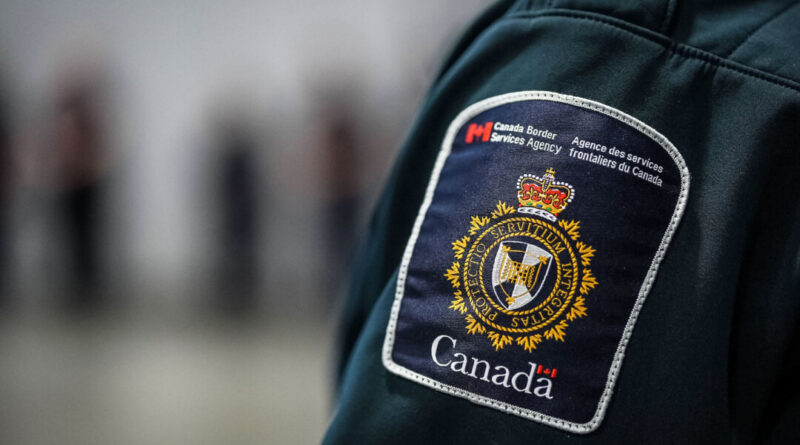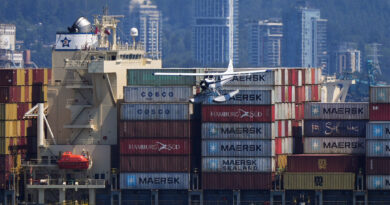Canada’s Flagging of Immigrants for Terrorism Concerns: How Many Are Identified?
Canada’s security screening process for immigration has been facing scrutiny following recent arrests of multiple immigrants for alleged terrorist plots.
Although these high-profile suspects were allowed into Canada, many others have been identified as potential security risks. When The Epoch Times inquired with the Canada Border Services Agency (CBSA) about the number of prospective immigrants rejected due to terrorism concerns, CBSA didn’t provide a specific figure but highlighted thousands of criminals attempting to enter Canada in the previous year. Among them, hundreds were flagged for ties to organized crime and categorized as “security threats,” which encompass terrorism and espionage.
The Numbers
CBSA reported discovering over 3,500 individuals suspected of “serious inadmissibility” in 2023.
An additional 37,000 were deemed “believed to be inadmissible” by an officer at a port of entry but opted to withdraw their applications and exit instead of being referred to the Immigration and Refugee Board. CBSA couldn’t offer detailed information on these cases or the reasons for inadmissibility, mentioning that factors could include health or financial concerns.
Out of the 3,500 individuals suspected of serious inadmissibility, 76 percent were flagged for serious criminal activities, while another 14 percent were identified for lesser criminality. Additionally, 6 percent were specifically linked to organized criminality, 3 percent for “security” reasons (not clearly defined), and 1 percent for human rights violations or war crimes.
When specifically asked about the number of cases related to terrorism concerns, CBSA could not provide further details. In 2023, the agency concluded security screenings for over 38,000 permanent or temporary resident application cases and identified around 800 of them as inadmissible due to security, human rights violations, or organized crime.
Foiled Plots
In a recent incident, two Toronto men, a father and son from Egypt, were apprehended on July 28 for an alleged terrorist scheme on behalf of the Islamic State of Iraq and al-Sham (ISIS). A House of Commons public safety committee launched an investigation in August to analyze the timeline of their immigration screening and approval.
During the committee session, concerns were raised regarding a 2015 ISIS propaganda video supposedly depicting the father, Ahmed Fouad Mostafa Eldidi, mutilating a prisoner with a sword. Ted Gallivan, CBSA Executive Vice-President, informed MPs that the agency acquired a copy of the video from the dark web after media reports surfaced. Gallivan clarified that the video was not accessible to CBSA during Eldidi’s screening process.

Ahmed Mostafa Eldidi (L) is seen in a courtroom sketch with his son, Mostafa Eldidi, as they appeared via video for a hearing in Newmarket, Ont., on Aug. 1, 2024. Alexandra Newbould/The Canadian Press

Muhammad Shahzeb Khan is shown in an undated handout image. The Canadian Press/HO – Quebec Superior Court
Another alleged terrorist, Muhammad Shahzeb Khan, a Pakistani national, was arrested in Quebec on September 4 for plotting an attack on a Jewish center in New York City on the anniversary of the Hamas terrorist assault on Israel.
US ‘Watchlist’ Encounters
U.S. Customs and Border Protection reported nearly 490 encounters last year with individuals on its terrorism watchlist crossing from Canada.
This figure marks the highest count since 2017, the initial year for which data is available on the agency’s website.
The number was 313 in the 2022 fiscal year and currently stands at 358 for the 2024 fiscal year. The statistics ranged between approximately 50 and 260 from 2017 to 2021.
Surge in Immigration, Screenings
The surge in immigration to Canada has necessitated an increase in mandatory security screenings.
Most requests pertained to citizenship applications (296,300), followed by refugees (128,900), temporary residents (46,400), and permanent residents (21,600).
CSIS highlighted challenges arising from the rapid increase in asylum claimants over the past five years, stating that it has led to port of entry pressures, delays in processing, and other strains on the asylum system.
When questioned in August by The Epoch Times about potential strain on resources due to the heightened workload, a CSIS spokesperson declined to comment on internal resource allocations.
Former CSIS intelligence analyst Phil Gurski shared insights with The Epoch Times, suggesting that the agency’s resources might be stretched thin.
“I don’t think they have the resources to do a full background check on everybody that the government was seeking to bring in to Canada,” he remarked.
CBSA emphasized its thorough examination of all travelers entering Canada and emphasized close collaboration with domestic and international law enforcement to detect and address any threats.
CBSA reassured the public, stating, “Canadians can be confident that Canada’s law enforcement and security agencies investigate and respond to potential threats,” adding, “We will always take the necessary action to keep Canadians and those on Canadian soil safe.”
Noé Chartier contributed to this report.




